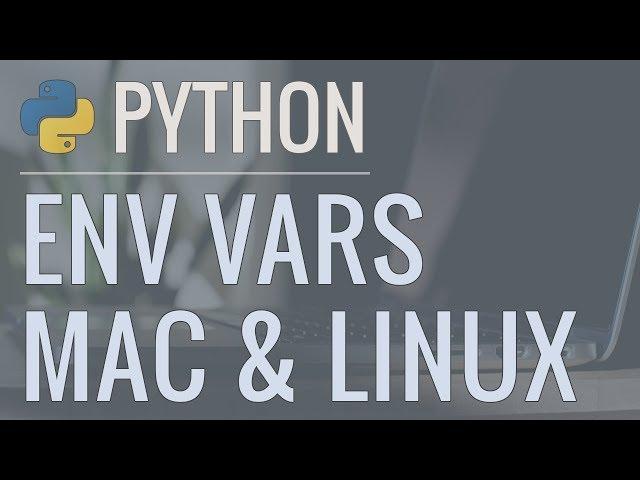
Python Quick Tip: Hiding Passwords and Secret Keys in Environment Variables (Mac & Linux)
Комментарии:

in linux after you save your enviroment variables you have to type source .bashrc before restarting your text editor :)
Ответить
how is having plain text passwords in environment variables secure?
Ответить
some reason i just get print of none
Ответить
And what about the .env file?
Ответить
Instead of using os.environ.get(), you can now just use os.getenv()
Ответить
Thank you for your help!!
Ответить
This video is outdated for latest version of mac
Ответить
Why does this print?
None
None

million 🔥
Congratulations

Easy & fantastic tutorial ! I will definitely use this method to hide my credentials on python boto3 script lol
Ответить
Amazing
Ответить
Is there a way to parse this to Powershell?
Ответить
I've been searching for a solution like this for several days... this solved so many of my headaches.
Ответить
I used a pip3 package o do this, but now I think this is simpler and easier..
Ответить
use this cmd `source .bash_profile` after saving the `.bash_profile` file
Ответить
I keep getting a smtplib.SMTPSenderRefused on video 0 of flask series
How do I check that my environmental variables are correct?

LOVE IT, nobody has explained better! thanks a lot!
Ответить
Corey MS ❤️❤️❤️❤️ your python videos are pure gold 🥰🥰🥰🥰🥰
Ответить
thx
Ответить
Hi Corey! Great video. If I input print(EMAIL_ADDRESS, should I get 'None' as my output?
Ответить
How do you make this work using a virtual environment?
Ответить
Thank You
Ответить
Sir Corey comeback man!!
Ответить
nice ;) thx
Ответить
I'm running Ubuntu 20.04 and the test script returned 'None' for me until I added the environment variables to ~/.bashrc instead of .bash_profile. So, it seems that the proper procedure may vary with each distribution of Linux.
Ответить
very helpful, thanks a lot
Ответить
Talented Teacher. Thanks for your pains. I want to one day build a python package for physics. Your lectures are great help.
Ответить
Thanks for this quick and concise explanation. Is this any more secure than hard-coding the password however? Couldn't someone cat your .bash_profile to see the password, or perform some other trickery to access it?
Ответить
Pretty helpful. But when print the variables, i get a None type back.
Ответить
you saved my life again!
Ответить
I think I should worship you for the rest of my life. You are always the savior.
Ответить
thank you for making sense of this for me - was struggling to understand it in text form only! :)
Ответить
In my experience, environment variables also serve one important purpose other than maintaining secrecy. By using of environment variables instead of hard coded values I could easily roll out my project without worrying about the API keys and other settings used in the development version updated before uploading source code to the deployment server.🔥
Ответить
Your explanations are great.
Ответить
no idea what just happened.
Ответить
@ Corey Schafer
Thanks for sharing.But it didn't work on AWS linux2 after modify .bash_profile.
How can I do ? Thnak you!!

Great information as always, but I was wondering if I could use a separate text file for holding my credentials and then load it into my python module, I can add that text file in my .gitignore so it will not be pushed. I mean it won't be nice if I generate too many environment variables, it would be confusing if I am working on multiple projects.
Ответить
Hey I'm getting an error when I request a password reset that says 'get_reset_token() missing 1 required positional argument: 'self''. Any idea what could be causing this? I've coped your code from your github so I'm confident I have exactly what you have!
Ответить
Still very useful 3 years later. Great videos. Btw, how do you manage credentials on scripts that will be hosted online for instance?
Ответить
Hi , Nice tutorial, just a quick question, will this work the same if the code is pushed to a remote server?
Ответить
How can i be able to access this value in some other machine if I want to??
Ответить
depending on the shell you are using, look for corresponding .xxrc file. (e.g. if you use zsh, .zshrc; if bash, then .bashrc)
Ответить
plz show me how to use this in the virtual env (venv) for windows
Ответить
How about creating a separate file for security data, then adding that file to gitignore, and reading the necessary data from that file when needed?
Ответить
I get None
Ответить
If you are using Linux Box , the solution is to put your environment variables in "/etc/environment".
Example in your /etc/environment file:
------------------------------------------------------------------------------------
DB_USER="Y=User name"
DB_PASS="Your Password"
-------------------------------------------------------------------------------------
And reboot your computer. you will have access to them in your python files using:
import os
DB_USER=os.environ["DB_USER"]

can you save the py file anywhere on the computer ??? does it matter??
Ответить
It didnt work for me i kept getting none
Ответить

























